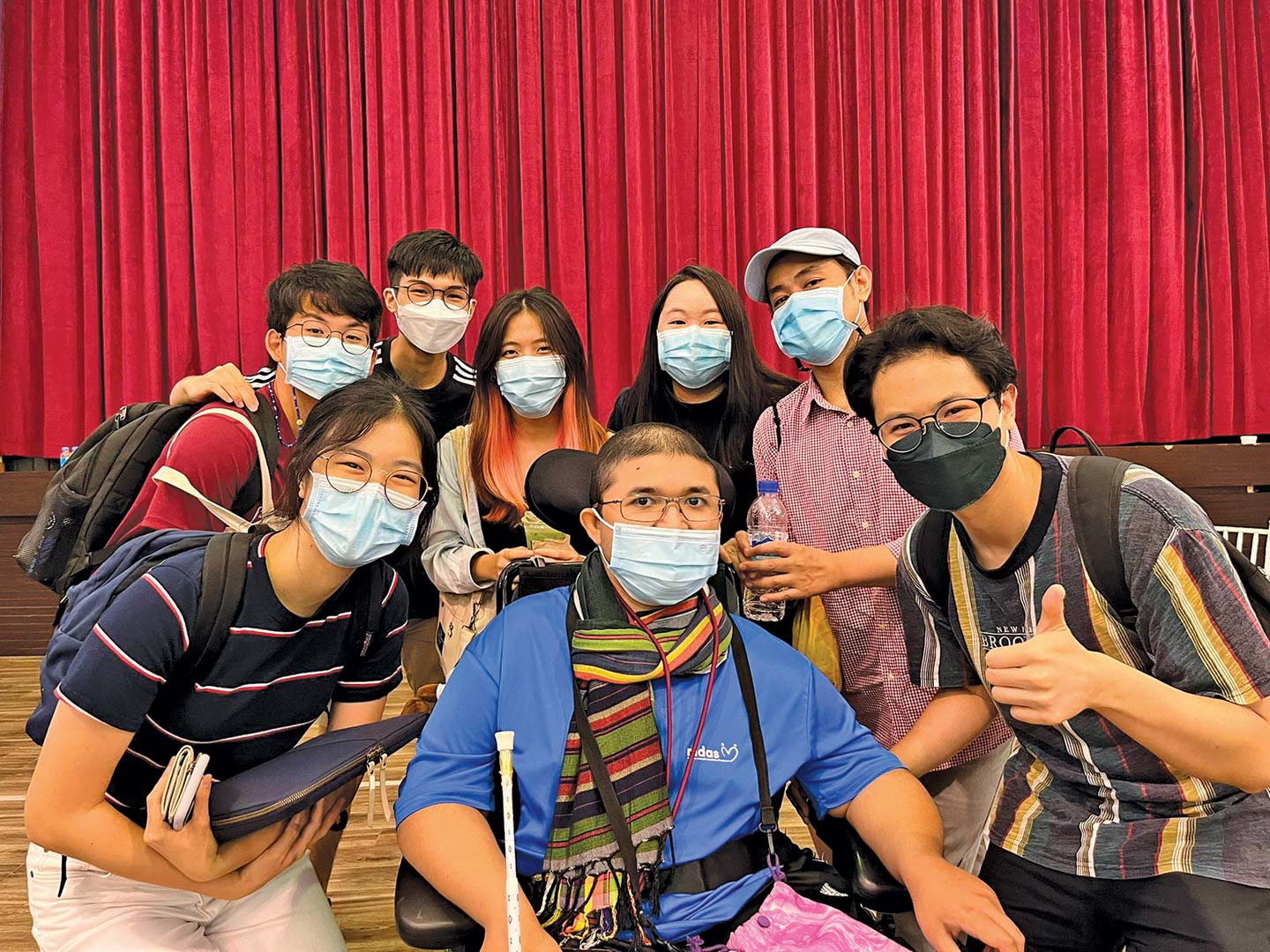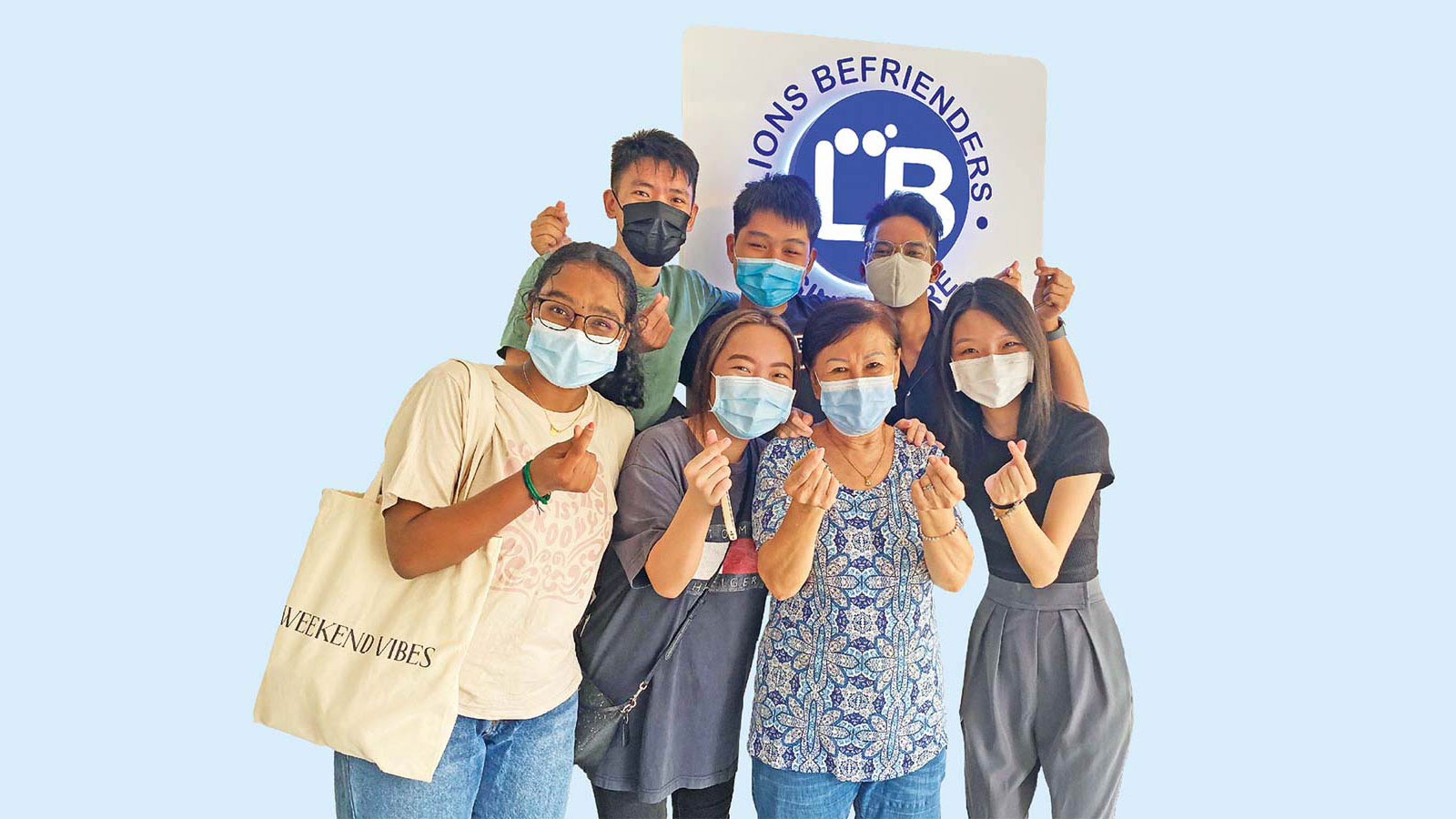
Issue 45
Jan 2023
ALL IN THE FAMILY
By Dr Goh Lay Hoon and Dr Ann Toh, NUS Family Medicine, Associate Professor Lydia Lau, NUS Alice Lee Centre for Nursing Studies, Associate Professor Wong Mun Loke, NUS Dental, Dr Leroy Koh, NUS Pharmacy

Since the Longitudinal Patient Experience (LPE) programme, a year-long home visit programme that allows healthcare students to apply what they have learnt in the classroom in the community, started about 10 years ago, it has since evolved.
A Story in LPE
F1 paused in the conversation on the Zoom call. The students fell silent because they were not sure how to respond to what F had shared. F is a 28-year-old designer whose chronic condition has confined him to a wheelchair. His mobility issues require him to wake up four hours before the time he plans to leave the house. Unlike others who can skip out of bed and be out of the house within a short time, F needs the help of both his father and brother for his bathing and toileting preparation each day. Finally, F broke the silence with his gentle smile and made a small joke. This daily drill that is part of F’s life was shared in a matter-of-fact manner with the students and this caught them by surprise. With relief, to the observing tutor, one student unmuted his microphone and resumed the conversation. The mood lightened and other students started to join in.
LPE and its role in NUS healthcare curricula
This story was one of many Zoom sessions experienced by first-year healthcare students from NUS Medicine, Alice Lee Centre for Nursing Studies and NUS Pharmacy and their tutors in the LPE programme in 2022. LPE started about 10 years ago with medical and nursing students. It has since grown to include NUS Pharmacy in 2021 and Dental students in the coming year. The LPE is a year-long home visit programme that allows these healthcare students to apply what they have learnt in the classroom in the community. In the classroom, students are taught how social determinants of health and health-related behaviours can influence people’s lifestyles and their healthcare choices. Following the classroom teaching, the students will visit a patient in their homes with their tutors through the LPE programme. LPE offers a unique opportunity for interprofessional students and tutors to interact and work together. Central to the LPE programme is the focus on patient-centredness which is understanding what matters to patients in life, health and illness. Exciting activities in 2023 will include a community walk with patients in their neighbourhoods. This walk allows students to trace their patients’ footsteps in their daily activities such as shopping for groceries or visiting the sinseh’s clinic. The walk will enrich the students’ learning of the impact of the social determinants of health in a patient’s daily routine.
Tutors in LPE
In LPE, the tutors are the students’ role models in appreciating the professional yet humane interactions with their patients. The tutors supervise the students during the home visits and facilitate the initial introduction between the patients, their families and the students. One tutor who is a general practitioner in the heartlands of Singapore joked that LPE is a programme that allows him to teach the students in the GP’s “home territory” instead of teaching a tutorial in the classroom. He enjoys mentoring students and sharing what he does every day as a general practitioner which includes making home visits, treating and comforting his patients many of whom are older people and lonely. The doctor felt that through the LPE programme, budding healthcare students are given a rare opportunity to appreciate that patients are people too, that their views about illness and treatments are often coloured by their upbringing and limited by their environments. After acknowledging those circumstances, students should recognise and help patients who are unable to adhere with instructions given by their healthcare providers due to such factors.
Students in LPE
As not all home visits are conducted with the tutors, LPE encourages the students to take charge and be responsible for conducting most of the home visits on their own. This independence allows students to build rapport with the patients and their families. It also provides the opportunity for nurturing interprofessional teamwork where students learn how to work effectively together to facilitate a meaningful visit for patients, caregivers and their peers. To aid in that process, students are given a small stipend from NUS Medicine to buy gifts for their patients. Students are careful when purchasing these gifts, choosing to buy fruits or healthy snacks for the patients who are usually older people with chronic conditions such as diabetes, hypertension and hyperlipidemia. During the pandemic period, a group of students creatively used the stipend to cheer up a young patient who was feeling isolated at home by sending him a surprise gift—bubble tea delivery!
Besides the home visits, some students went the extra mile to accompany their patients for their medical appointments in the polyclinics or hospitals on the odd occasions when the patients’ families were unable to. One group of students who accompanied their patient to the polyclinic shared that they wanted to speak with the patient’s doctor after learning that the patient had difficulty making her questions and concerns clear to the doctor.
Patients’ role in LPE
Patients and their families and caregivers are invited to join the LPE if they are open to interacting with students and share with students how they live and cope with their chronic conditions or disabilities in their daily lives. Many patients have chronic and sometimes debilitating illnesses that make them mostly homebound. Some live alone while others are mostly alone at home when their children go to work. Although a majority of patients are able to move about independently, they are lonely after retiring from their jobs. Many students in the LPE programme have partaken meals with their patients, making good use of the stipend given to them. One patient remarked that the meal at the coffeeshop with the students felt like having all his grandchildren at one place for a get-together. Other groups have watched movies with their patients or enjoyed coffee together at the neighbourhood coffeeshop. Another group of students was inspired by a LPE participant who is an avid volunteer at Lions Befrienders. They had first-hand experience on how this participant supports her peers in various ways and this has provided her with an unmatched fulfilment. The LPE experience helped the students see how an older person spends her time fruitfully and challenges herself both mentally and physically.
Returning to the story
After the Zoom call with F, the students met their tutor a week later to debrief on the session. The students shared how they were struck and moved by F’s courage and positive outlook in life despite his physical condition. F is merely a few years older than them and could easily be one of their friends in school. Yet their lives and future trajectories are and will be very different. Below are excerpts from the reflections written by two students who met F:
It amazed me … how independent, creative, strong-willed he is. Despite his condition, and the many difficulties he faced in life, he still bravely looks forward to living a fulfilling life each day… Hearing about his likes and dislikes, his accomplishments, and hobbies, reminded me that our patients are just like us, and that they should not be defined by their illness or condition, but instead valued for their thoughts, opinions and decisions.”
I feel that society tends to assume that individuals… face limitations in their daily lives and we are taught… to feel sympathy towards them… However, he is a physical testament that such a view is erroneous and comes from a position of privilege... He is truly someone that has accepted his condition wholeheartedly and strives to be a source of positivity which I think is extremely admirable.”
Sir William Osler, an eminent physician in the 19th century said:

This quotation aptly describes the importance of listening to the patients as persons when delivering care to them. Although LPE does not involve the diagnosis and clinical management of patients, the programme provides a year-long experiential learning journey for students to learn to listen to their patients attentively and walk in their shoes. The early exposure to interacting with patients in the real-world context provided by LPE heralds the beginning of imbibing a person-centred attitudes towards patient care in our students as they journey to become competent and compassionate healthcare professionals of the future.

LPE students and their LPE participant enjoying a day out in the community.
1 To protect the identity of the patients whom the students interacted with, their real names have been replaced with letters.
Source: Mark E. Silverman, T. Jock Murray, and Charles S. Bryan, eds. The Quotable Osler. Philadelphia, PA: American College of Physicians, 20Guerin, hepatitis, and typhoid.
More from this issue

ALUMNI VOICES
Integrating Medicine and Social Science


